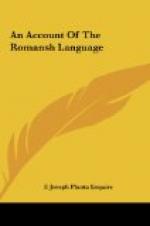The same corruption, or coalescence, which gave rise to the Gallic Romance, and to that of the Grisons, must also have produced in Italy a language, if not perfectly similar, at least greatly approaching to those two idioms. Nor did it want its northern nations to contribute what the two other branches derived from that source.[BA] But be the origin what it will, certain it is, that a jargon very different from either the Latin or the Italian was spoken in Italy from the time of the irruptions of the barbarians to the successful labours of Dante and Petrarca; that this jargon was usually called the vulgar idiom; but that Speroni,[BB] the father of an Italian literature, and others, frequently call it the common Italian Romance. And if Fontanini’s[BC] authorities be sufficient, it appears that even the Gallic Romance, by the residence of the papal court at Avignon, and from other causes, made its way into Italy before it was polished into the Provencal.
As to Naples and Sicily, the expulsion of the Saracens by the Normans, under Robert Guiscard in 1059, must have produced in that country nearly the same effect, a similar event soon after brought about in England. And in fact we have the authority of William of Apulia[BD] to prove, that the conquerors used all their efforts to propagate their language and manners among the natives, that they might ever after be considered only as one people. And Hugo Falcland[BE] relates, that in the year 1150, Count Henry refused to take upon him the management of public affairs, under pretence of not knowing the language of the French; which, he adds, was absolutely necessary at court.
That the language of the Romans penetrated very early into Spain, appears most evidently from a passage in Strabo,[BF] who asserts that the Turditani inhabiting the banks of the Boetis, now the Guadalquivir, forgot their original tongue, and adopted that of the conquerors. That the Romance was used there in the fourteenth century appears from a correspondence between St. Vincent of Ferrieres and Don Martin, son of Peter the IVth of Arragon;[BG] and that this language must once have been common in that kingdom appears manifestly from the present name of the Spanish, which is still usually called Romance.[BH] These circumstances considered, I am not so much inclined to discredit a fact related by Mabillon,[BI] who says, that in the eighth century a paralytic Spaniard, on paying his devotions at the tomb of a saint in the church of Fulda, conversed with a monk of that abbey, who, because he was an Italian, understood the language of the Spaniard. Neither does an oral tradition I heard some times ago appear so absurd to me, as it did when it was first related to me, which says, that two Catalonians travelling over the Alps, were not a little surprized when they came into the Grison country, to find that their native tongue was understood by the inhabitants, and that they could comprehend most of the language of that district.




